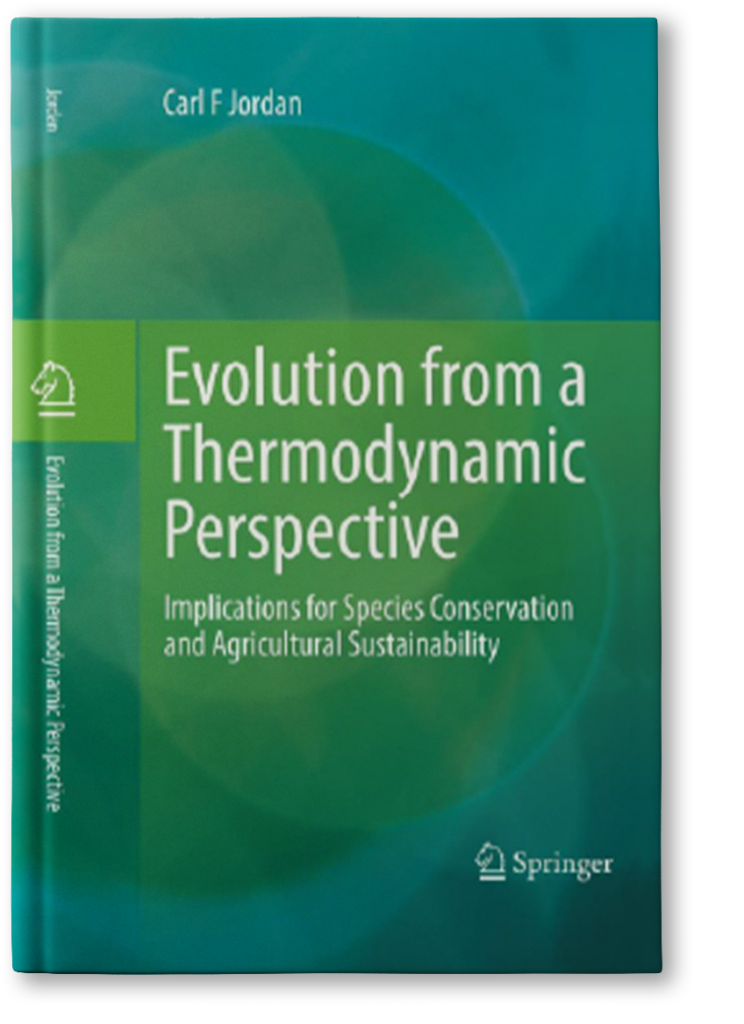Mission Statement
In G. Evelyn Hutchinson’s The Ecological Theater and the Evolutionary Play, individual species are the players and the theater ranges from a mountain top in Kenya to spruce forests in Maine. In the metaphor, the ecological theater is a matrix of geology, climate, and species, the environment within which the evolutionary play takes place. The plot is an adaptation to the environment. The role of each species in the play is defined by its “niche,” a particular subdivision of the matrix. This has been the dominant evolutionary paradigm for over half a century. In contrast, the thermodynamic perspective has been largely ignored by evolutionary biologists. This is unfortunate because an understanding of energy transformations is critical to understand the origin of life and the evolution of life’s higher forms. Further, understanding energy transformations is the basis for the sustainable management of natural resource systems.
Evolution from a Thermodynamic Perspective presents the tremendous gains that have occurred in the past few decades about the mechanisms underlying biophysical theory applied to evolution. The theory will be controversial, in as much as many evolutionary biologists may view it as contradicting or opposing Neo-Darwinism. However thermodynamic evolution does not contradict but rather complements Neo-Darwinism in that it explains mechanisms for the evolution of higher forms of life that are missing in standard evolutionary theory. The mission of this website is to provide a forum where the complementary role of thermodynamics can be questioned and discussed.
Continuing the Conversation on Evolution
Entropy means that disorganization is inevitable, but during evolution, complexity and organization increase. How is that possible? This is a question that cannot be answered by genetics, a mechanistic approach to evolution. Thermodynamic theory presents a systems view governed by thermodynamic laws. It argues that species and ecosystems evolve reciprocally and simultaneously and that autocatalysis during the feedback system provides energy that fuels an increase in organization and complexity. The theory is presented in the book Evolution from a Thermodynamic Perspective, but the ideas are controversial. This website is an opportunity to question and discuss these ideas.

About the Book
“Survival of the fittest” is a common interpretation of evolutionary theory. It is a tautology, because those that are “fit” are the ones that survive, but to survive, a species must be “fit”. Modern evolutionary theory avoids the problem by defining fitness as reproductive success, but the complexity of life that we see today could not have evolved based on selection that favors only reproductive ability. There is nothing inherent in reproductive success alone that could result in higher forms of life. One-celled organisms survive remarkably well, so for survival there is no evolutionary advantage in multi-cellularity. If reproductive success were the only criterion for selection, life on earth today would consist only of one-celled organisms well adapted to their environment. For evolution of higher organisms, there has to be a characteristic that produces an increase in complexity. Over 100 years ago, Ludwig Boltzmann, an Austrian physicist, proposed power output as a definition of evolutionary fitness…
About the Author
Dr. Carl F. Jordan is Professor Emeritus of the Odum School of Ecology, University of Georgia. He began his professional career in 1966 with the Atomic Energy Commission (now Dept. of Energy) and spent eight years studying the environmental fate of radioactive isotopes from atmospheric fallout. In 1974, he joined the School of Ecology and carried out studies of nutrient cycles and energy flow in rain forests of Venezuela, Brazil, Mexico, Costa Rica, and Thailand. In 1993, he purchased a 100-acre farm near Athens Georgia, started research on organic farming, and began the first course in organic farming at the University of Georgia. He is the author of 11 professional books plus 130 peer-reviewed papers and has mentored 31 graduate students.

Join the Discussion
To post a question or comment, please register for an account and then log in. Then post your comment or question to the appropriate forum.